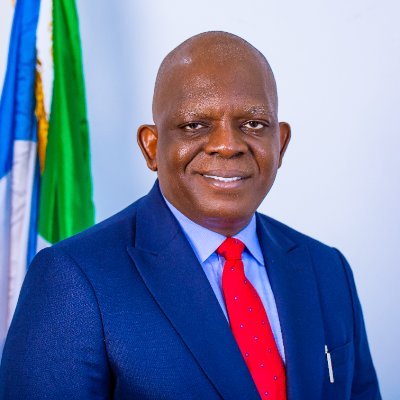
The Nigerian Shippers’ Council (NSC) has revealed that the country’s port digitization efforts remain in a hybrid stage, primarily due to economic challenges faced by stakeholders.
This is even as industry stakeholders are urging the implementation of the National Single Window (NSW) system to streamline operations and enhance efficiency, while advocating for a cautious approach to ensure all parties are adequately prepared for the transition.
Shipping Position Daily recalls that the Executive Secretary of NSC, Mr Pius Akutah during a recent courtesy visit by the Managing Director of the News Agency of Nigeria (NAN), Malam Ali M. Ali noted that the council has saved the Federal Government N31.1 billion through the Electronic Regulatory Port Portal (ERPP) between January and June 2024.
The ERPP is an activity the NSC carries out for the Central Bank of Nigeria (CBN) to confirm the reasonableness of Charter Party fees. According to Akutah, the council has saved the economy a lot of money that would otherwise have been repatriated.
The Executive Secretary said that the council conducted a quality assurance test between January and June 2024 to confirm the demurrage applications, adding that the test revealed that out of total requests of N50.8 billion, N19.6 billion requests were validated as reasonable for payment.
However, speaking exclusively to Shipping Position Daily, the Director, Regulatory Services of the Council; Mrs. Margaret Ogbonna noted that the digitalization process at the ports remains a mix of digital and manual systems due to economic constraints. She pointed out that while some organizations have adopted digital solutions, many still rely on a hybrid system that combines digital and manual processes.
While acknowledging the ongoing efforts to reduce paperwork and streamline operations, Mrs. Ogbonna explained that achieving full digitalization at Nigerian ports is hindered by the high cost of transformation and the varying readiness of different stakeholders, including truckers and private sector players.
Mrs. Ogbonna highlighted that while some organizations have adopted digital solutions, others still rely on manual processes, which slow down the overall efficiency. She pointed out that truckers, in particular, face challenges in integrating into the computerized entry system.
In response to these challenges, Mrs Ogbonna informed that the NSC has introduced an Electronic Regulatory Platform to improve compliance and reduce the need for physical presence at the ports. She noted that this platform has already led to faster submission of required documentation from terminal operators.
Looking to the future, Mrs. Ogbonna projected that full digitalization would not be possible until the Government agencies in charge deploy the National Single Window system. She called for greater efforts in port digitalization to streamline operations and reduce paper-based documentation.
She explained that: “The level of digitalization in our ports is primarily an advocacy effort. Even those that have implemented digitalization are not fully there yet, as we still encounter a hybrid system in most cases. We aim to reduce paperwork, but private individuals and stakeholders, including truckers, have yet to fully embrace digitalization.
“At present, what we are focusing on is dealing with documentation and processes. We carried out an oversight monitoring exercise to assess the level of digitalization compliance, and I will share our findings. We have developed an Electronic Regulatory Platform that allows us to access necessary data remotely, avoiding the need for physical entry into the ports. What used to take us a whole year to collect was submitted within a month”.
“This shows that service providers are ready for digitalization, because it improves their services and revenue. When the Nigerian Customs Service deploy their community system, which will serve as a one-stop shop for all port documentation and activities, we can expect to reach an 80% level of digitalization,” she concluded.
Also speaking, the National Secretary of the Association of Registered Freight Forwarders of Nigeria (AREFFN), Mr Frank Obiekezie advocated for a measured approach to the digitalization of Nigeria’s ports, stressing that infrastructure shortcomings and stakeholder preparedness must be addressed before full-scale implementation.
Obiekezie maintained that for digital ports, terminals, and shipping companies to function seamlessly, there must also be a corresponding development of digital freight forwarders, even as he highlighted the need for grassroots involvement, he emphasized the importance of comprehensive training for stakeholders.
The AREFFN scribe pointed out critical limitations in Nigeria’s infrastructure, such as unreliable telecom networks and power supply, which complicate the transition to digital systems. He recounted recent issues with digitalization efforts, including a significant disruption in operations due to a failure in NAFDAC’s payment system and others which affected operations for nearly a month.
“When discussing digitalization, it’s crucial to acknowledge that we are not yet fully equipped. There will be challenges, and rather than imposing penalties, proactive solutions should be sought when systems fail. Our telecom infrastructure and power supply are not ideal yet, which impacts digitalization. The success of these initiatives depends heavily on addressing these foundational issues.
On his part, the immediate past Chairman, Institute of Chartered Ship Brokers (ICS), Dr. Chris Ebare called on the Nigerian Ports Authority (NPA) to intensify efforts towards the digitalization of Nigeria’s ports, emphasizing the need for strong collaboration with other regulatory bodies to achieve a seamless transformation.
Dr. Ebare highlighted that while the NPA plays a key role, the responsibility for port digitalization is shared among various regulatory bodies, including the Nigerian Shippers’ Council and the Nigerian Customs Service.
While stressing that achieving full digitalization requires a coordinated effort across all stakeholders involved in port operations, Dr. Ebare also urged terminal operators to improve their digital infrastructure to align with government policies and systems.
“The work is not only for the NPA but also includes other regulatory bodies such as the Shippers Council, Customs, and other agencies at the port. Most importantly, terminal operators need to up their game digitally in line with government systems and policies,” Dr. Ebare stressed.















